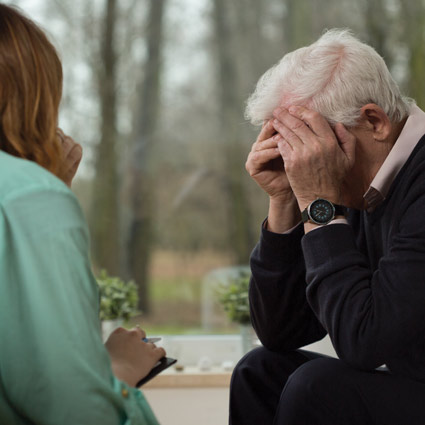
By Jonathan Evans
Herbal Information Specialist for the Herbarium
Anxiety, panic attacks, the “what ifs?” seem to be manifesting themselves in ever increasing numbers. The political and cultural condition of our nation, unrest, unsettled conditions throughout the world, economic uncertainty, climate change, taxes, worry about our kids, worry about our parents – all seem to be hitting us constantly.
Physiologically when faced with stress and anxiety, the sympathetic nervous system kicks in and increases heart contractions, dilates bronchial tubes and pupils, stimulates sweat, stimulates adrenal hormone production, and inhibits digestion. After the stimulus or danger is past, your parasympathetic nervous system brings these functions back to normal – or is supposed to. Unfortunately in today’s world, it seems there is never enough time between crises to recover.
America the anxious
Webster’s defines anxiety as “troubled in mind: uneasy: worried.” Some people will tell you “it’s all in your head,” which is true but seems a flip answer to a real problem. Prescriptions just seem to slow down an individual’s responses, leaving people feeling depressed, but not quieting the mental chatter that seems to get worse when people try to go to sleep.
And a bad sleep pattern – or lack of sleep – simply exacerbates the problem. Breaking that cycle is the first thing to try.
Getting some rest
Some of the basic supplements we work with at the Herbarium to help combat the effects of anxiety include magnesium, vitamin B complex and Kava Kava. Here’s a brief primer:
Magnesium – Magnesium is nature’s calmative mineral. It can help ease tension, relax muscles and help you get a good night’s sleep.
The B complex of vitamins – This group is essential to nerve function and the transmission of electrical impulses through the nerve synapse. B-complex vitamins are used up very quickly by the body and need to be supplemented at higher doses than the government’s daily-recommended amounts, as I outlined in a previous column. (Prime Vitamin Guide Part 2 9/28/2018, available online at www.primeontheweb.com)
Kava Kava – The herb Kava Kava (Piper methysticum) has been used in the South Pacific for centuries as a relaxant herb.
However, if you research Kava, you will find information saying it is dangerous to the liver.
Let me give you the straight story on Kava.
Many years ago, a German pharmaceutical company made a batch of Kava, but instead of using only the root, they used the aerial part of the plant and the peels, which contained liver toxic chemicals, essentially the trash. Guess what? Several people suffered liver damage and a few died. Because of this, the European Union (E.U.) banned Kava and the U.S. put a warning on it. Subsequently researchers found there had never been a problem with Kava and liver damage, except in cases of alcoholics who were abusing Kava and alcohol. Issues with liver damage never happened before with the herb, or since the incident in Germany. The E.U. lifted its ban, but the U.S. left the warning in place. That is the whole story. If you have liver problems, then you may not want to use Kava, but if your liver is in good shape, do not worry.
More anxiety aids
Added to the “Big Three” mentioned above are a variety of botanicals that can have a positive impact on anxiety. Here are three the Herbarium suggests:
Lemon balm – Lemon Balm (Melissa officinalis) has been used in Europe for over 2 thousand years for nervous system disorders.
Passion flower – Passion flower (Passiflora incarnate) is used as a mild sedative, alone and in combination with other herbs.
Both Lemon balm and Passion flower help with relieving tension, helping sleep and quieting the “monkey mind chatter” of an overactive brain.
Valerian – Valerian (Valeriana officinalis) is a well-know botanical used as a mild sedative and tranquilizer. Studies have shown Valerian is being used effectively for social anxiety and anxiety disorders.
*Please note, when I use the terms “sedative” or “tranquilizer,” it is not in the same category as a pharmaceutical, but more as an adjective to describer the effect. These herbs can be used during the day at lower doses and still allow you to function in a normal manner.
Helping the body recover
Addressing the overstimulation of the adrenals, several herbs, usually in combinations, have a very positive effect in recovering from adrenal exhaustion. Here’s what to look for when shopping for one of these blends:
Formulas should or could include ingredients such as Licorice root (Glycyrrhiza glabra), Siberian ginseng (Eleutherococcus senticosus), or Rhodiola (Rhodiola rosea).
Finally there is CBD oil, which has shown great results for anxiety and so many other conditions. It is available in differing strengths, and forms, be it oil, gummies, and vape pens. Just make sure you know what you are buying. Your supplier should be able to speak intelligently about the products they offer, including some kind of third party analysis. Again, I addressed this concern in a previous article, which you can find on Prime’s website. (Prime 11/20/2018 CBD - Be an Informed Consumer)
Hoping this information helps everyone quell some of their anxiety!
— Jonathan
Send questions on botanical remedies to: Natures Rx: Jonathan Evans at herbarium258@gmail.com, or by regular mail to: The Herbarium, 264 Exchange St., Chicopee, MA 01013. If requesting additional info, include a self-addressed stamped envelope.